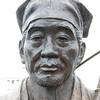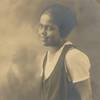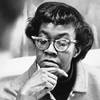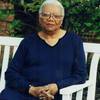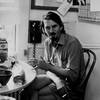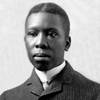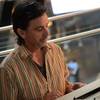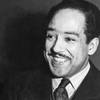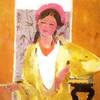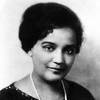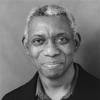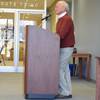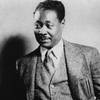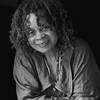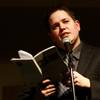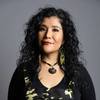Filter By
"Mexican" Is Not a Noun
to forty-six UC Santa Cruz students and
seven faculty arrested in Watsonville for
showing solidarity with two thousand
striking cannery workers who were mostly
Mexican women, October 27, 1985
“Mexican”
is not
a noun
or an
adjective
“Mexican”
is a life
long
low-paying
job
a check
mark on
a welfare
police
form
more than
a word
a nail in
the soul
but
it hurts
it points
it dreams
it offends
it cries
it moves
it strikes
it burns
just like
a verb
The table
Translated from the Portuguese by Margaret Jull Costa
My country
is this room opening onto the balcony,
it is also the balcony with its flowers
that come and go over the months, and that seem to me
luminous even when they turn the color
of a sad wind
My country
is the white cloth covering me, the dishes placed on me
each day, the arms that lean on me,
even the water in which I nearly drowned,
spilled absentmindedly by the hand that poured it
over my body, a clumsy,
thoughtless hand
I came to know it early on,
my country that is,
when it was still the perfumed landscape
of various timbers, my sisters all, of the sawmill,
its air filled with tiny filaments and sweetly
scented dust, the fingers that then chose me,
a broad piece of wood, and stroked and caressed me
with planes, varnish, polish
that was already my country: a prairie of insects,
white winds, the living sap that ran
in my veins, the water I drank to survive,
and that protected me
May the hand that rests on me
here, now,
remember this our shared condition:
we came from the same realm, and to that same realm
we will go, she and me:
the atoms that shaped and made me
could so easily have been hers
How to Get into a Poem
(Standing Stone Creek, Pa.)
[A startling observation about the nature of human life]
or [A concrete description of trout]
[Backstory, alluding to an individuating experience]
or [Personal background, like “I have a weird relationship
to rural America”]
[Imagery only loosely related to backstory/background]
[Plants]
[Fruits]
or [Tropical fruits if part of you is tropical]
[Some intellectual discourse on the word “part”]
or [Agonized associative thinking about the nature
of something politically urgent, like colorism]
[A return to the opening vignette so folks stay on track,
like “is it possible that a suburban mixed kid actually
has nothing at all to claim, not the trout, not the breadfruit”]
[A direction, e.g. “towards”]
or [A time e.g. “now” or “after”]
[A prepositional or noun phrase if grammatically necessary]
[A turn, which should also be startling, as in oh
this is what the poem is really about]
or [Imagery that achieves roughly this purpose, like that of
the properties of brackish water,
or the length and nature of brackish days]
Woman Work
I've got the children to tend
The clothes to mend
The floor to mop
The food to shop
Then the chicken to fry
The baby to dry
I got company to feed
The garden to weed
I've got shirts to press
The tots to dress
The cane to be cut
I gotta clean up this hut
Then see about the sick
And the cotton to pick.
Shine on me, sunshine
Rain on me, rain
Fall softly, dewdrops
And cool my brow again.
Storm, blow me from here
With your fiercest wind
Let me float across the sky
'Til I can rest again.
Fall gently, snowflakes
Cover me with white
Cold icy kisses and
Let me rest tonight.
Sun, rain, curving sky
Mountain, oceans, leaf and stone
Star shine, moon glow
You're all that I can call my own.
Meditations in an Emergency
I wake up & it breaks my heart. I draw the blinds
& the thrill of rain breaks my heart. I go outside.
I ride the train, walk among the buildings, men in
Monday suits. The flight of doves, the city of tents
beneath the underpass, the huddled mass, old
women hawking roses, & children all of them,
break my heart. There’s a dream I have in which I
love the world. I run from end to end like fingers
through her hair. There are no borders, only wind.
Like you, I was born. Like you, I was raised in the
institution of dreaming. Hand on my heart. Hand
on my stupid heart.
When the winter chrysanthemums go
translated from the Japanese by Robert Hass
When the winter chrysanthemums go,
there's nothing to write about
but radishes.
Salmon
My father and I sit at a sushi bar in my new city
sampling three different kinds of salmon nigiri.
He tells me about a great funeral speech
he recently heard a son give for his father.
The speech was structured around regrets
everyone assumed the father didn’t have,
interspersed with hilarious stories involving boys
crashing the family van and fishing mishaps.
The ivory salmon is pale and impossibly soft.
The sliver of steelhead, orange enough
to pretend it’s salmon. How else to say it.
I am my father’s only child, and he is my mother.
We dip our chopsticks into a horseradish paste
dyed green and called wasabi. I know his regrets.
I could list them. But instead at his funeral
I will talk if I can talk about nights like this,
how good it felt just to be next to him,
to be the closest thing he had.
Your Songs
When first you sang a song to me
With laughter shining from your eyes,
You trolled your music liltingly
With cadences of glad surprise.
In after years I heard you croon
In measures delicately slow
Of trees turned silver by the moon
And nocturnes sprites and lovers know.
And now I cannot hear you sing,
But love still holds your melody
For silence is a sounding thing
To one who listens hungrily.
The Last Bee
After the last ee
had uzzed its last uzz,
the irds and the utterflies
did what they could.
ut soon the fields lay are,
few flowers were left,
nature was roken,
and the planet ereft.
One Art
The art of losing isn’t hard to master;
so many things seem filled with the intent
to be lost that their loss is no disaster.
Lose something every day. Accept the fluster
of lost door keys, the hour badly spent.
The art of losing isn’t hard to master.
Then practice losing farther, losing faster:
places, and names, and where it was you meant
to travel. None of these will bring disaster.
I lost my mother’s watch. And look! my last, or
next-to-last, of three loved houses went.
The art of losing isn’t hard to master.
I lost two cities, lovely ones. And, vaster,
some realms I owned, two rivers, a continent.
I miss them, but it wasn’t a disaster.
—Even losing you (the joking voice, a gesture
I love) I shan’t have lied. It’s evident
the art of losing’s not too hard to master
though it may look like (Write it!) like disaster.
Boihood
All I ever wanted to be was a song—
something soft and light held in the mouth
sung sweet beneath the coming dawn.
I return to that first desire—its gingham blouse
rubbed against the heavy pull of flesh hovered
in a dark that I can only recall as that dark.
I ask what grace awaits that tender tendril’s suffered
stretch of green wide enough to tear a stark
light out from under a troubled sky? I return
to the center of that smallness and sing its wounds—
jagged rasp crooned until edged out and earned.
I was the only boi I knew dreaming in soft bruise.
And it made me as beautiful as the blood’s slow sprawl
at my knee, right before punching a bullying boy to crawl.
Molly Brodack
I am a good man.
The amount of fear
I am ok with
is insane
I love many people
who don’t love me.
I don’t actually know
if that is true.
This is love.
It is a mass of ice
melting, I can’t hold
it and I have nowhere
to put it down.
Life
Life, believe, is not a dream
So dark as sages say;
Oft a little morning rain
Foretells a pleasant day.
Sometimes there are clouds of gloom,
But these are transient all;
If the shower will make the roses bloom,
O why lament its fall?
Rapidly, merrily,
Life’s sunny hours flit by,
Gratefully, cheerily
Enjoy them as they fly!
What though Death at times steps in,
And calls our Best away?
What though sorrow seems to win,
O’er hope, a heavy sway?
Yet Hope again elastic springs,
Unconquered, though she fell;
Still buoyant are her golden wings,
Still strong to bear us well.
Manfully, fearlessly,
The day of trial bear,
For gloriously, victoriously,
Can courage quell despair!
Speech to the Young: Speech to the Progress-Toward
Say to them,
say to the down-keepers,
the sun-slappers,
the self-soilers,
the harmony-hushers,
"Even if you are not ready for day
it cannot always be night."
You will be right.
For that is the hard home-run.
Live not for battles won.
Live not for the-end-of-the-song.
Live in the along.
The Egg Boiler
Being you, you cut your poetry from wood.
The boiling of an egg is heavy art.
You come upon it as an artist should,
With rich-eyed passion, and with straining heart.
We fools, we cut our poems out of air.
Night color, wind soprano, and such stuff.
And sometimes weightlessness is much to bear.
You mock it, though, you name it Not Enough.
The egg, spooned gently to the avid pan,
And left the strick three minute, or the four,
Is your Enough and art for any man.
We fools give courteous ear--then cut some more,
Shaping a gorgeous Nothingness from cloud.
You watch us, eat your egg, and laugh aloud.
Marigold
Each flower a wilting sun
The death of a new day is never kind
Grief ain’t no song
No loss is this romantic
excerpt from “Listen to the Golden Boomerang Return”
our first lightning
strike was convulsive
we felt sad for our
violence after
exterminating
wolves and bison
we do not need a
doctor to say
dance dance
dance before
the song
runs out
learn how
to live so
wilderness
never
becomes
mythology
we put them
in parks to be
wild on purpose
a museum of fur
fangs and hooves
Calculations
“I don’t know what to tell you.
Your daughter doesn’t understand
math. Numbers trouble her, leave
her stuck on ground zero.”
Y fueron los mayas
quienes imaginaron el cero,
un signo para nada, para todo,
en sus gran calculaciones.
Is zero the velvet swoop into dream,
the loop into plumes of our breath?
“I suggest you encourage languages.
Already she knows a little Spanish,
and you can teach her more of that.
She lives for story time.”
In the beginning there was nothing.
Then the green of quetzal wings.
Las historias siguen cambiando,
sus verdades vigorizadas
con cada narración
como X x X = X2
If God Asks, Tell Her I Give This Place Three Stars
No more and no fewer.
Yes, the vistas were majestic.
Yes, the smoked salmon omelets were–I’ll say it–divine.
I don’t think I’m alone, however, when I say there were never
enough Saturdays, and there were always too many options for
choosing how to spend them–cliff diving or window shopping,
getting the oil changed or self-destructing in front of a stranger.
And while some of the neighbors contributed in kind to courtyard
barbecues, others were [ ], and you never knew which you
were getting until you’d already paid the first and last month’s rent.
I’m not saying I didn’t have a good time, I’m just saying I’m not
sure I should have. It was all too much, and it was never enough,
and I can’t help but feel as if I’ve forgotten more than I could ever
remember.
The woman who is being paid to swab my grandmother’s dry lips
sings the psalter like a seraph, and it should be me there with the
wet Q-tip, but I have to be elsewhere if I want to have the means to
afford a person to also swab my own chapped lips when it’s time.
It is the wildest, weirdest, most heartbreaking planet I’ve ever been.
I swear I just got here, but it feels like I’ve been here forever.
I don’t want to leave, & I absolutely, positively never want to ever
come back.
Split
At birth my parents pulled my legs
and split me lengthwise like a wish.
Rumiñahui saved his city
from Spaniards by striking two stones,
holy temples made pure as ash.
When a concerned citizen pinned
me to airport wall to check my
origin, I whispered, thank you.
My dad says, Good, we’re safer now.
My uncle: then leave the country.
Christmases, I stay home in bed.
Only the chaste were burned alive.
One mind replies, I want to live.
The other: I want to live well.
Fate
By the time you know
your fate, it’s too late to change.
The birds in cages
know this but still chew the bars.
Maybe hope tastes like metal.
Is It Rude for Barbie Chang
Is it rude for Barbie Chang to tell men
she doesn’t love them
just the idea of them what if we don’t
even love living but just
the idea of it pictures always look
lovely but it was an
ugly day if women were actually paid
the same as men would
we all just pass on the highest bidder
who says it’s a privilege
to be romantic romance with its antics
and its time limits like the
nut that never tells us or other nuts
when it will let go
we stand under the tree ready to
collect them with our
arms wide open as in waltzing who
authored the word love
does anyone know the author’s original
intent does it matter
that no one knows exactly what it means
does it matter that it
might signify everything what if we never
needed a word for it
what if it is shapeless and composed
of gestures if we name
the thing love it doesn’t mean it
will last a nut does its
best to last but at some point just falls
like all the others before it
God, Gods, Powers, Lord, Universe—
If you cannot, at the moment, give me much joy,
I get it. I have asked
& received many a great joy
already. Just give me, if you can spare it,
a small joy, say, the size
of a ketchup packet. If that’s too much
to ask for, then how about a small
kindness, a tiny kindness, the size of a kiss
from a dust mote? No?
Okay. Would it be possible for you to take
away some things, then? For instance,
the soreness on the right side of my neck?
If you could remove maybe half
a pinch of that soreness, I would leap up
as though it were a great joy. I mean,
it would absolutely be a great, great joy,
thank you in advance, O
highest O mightiest O most.
Still no? Well. What about this
sense that everything has become
very slippery, everything is slipping
right out of my fingers & faster
every day? I’m not asking you to cure
my fear. Nor unslipify
my fingers. Only, if you could,
if you have a quarter of a split
nanosecond, it would be
greatly appreciated, see, I don’t
need joy or kindness
or ketchup, I
beg you, if you are
a being, a higher, some
Mysteries that can listen, can
mercy, I just need to lose
a little
less quickly.
We Used Our Words We Used What Words We Had
we used our words we used what words we had
to weld, what words we had we wielded, kneeled,
we knelt. & wept we wrung the wet the sweat
we racked our lips we rang for words to ward
off sleep to warn to want ourselves. to want
the earth we mouthed it wound our vowels until
it fit, in fits the earth we mounted roused
& rocked we harped we yawned & tried to yawp
& tried to fix, affixed, we faceted, felt.
we fattened fanfared anthemed hammered, felt
the words’ worth stagnate, snap in half in heat
the wane the melt what words we’d hoarded halved
& holey, porous. meanwhile tide still tide.
& we: still washed for sounds to mark. & marked.
untitled
some dreams hang in the air
like smoke. some dreams
get all in your clothes and
be wearing them more than you do and
you be half the time trying to
hold them and half the time
trying to wave them away.
their smell be all over you and
they get to your eyes and
you cry. the fire be gone
and the wood but some dreams
hang in the air like smoke
touching everything.
Differences of Opinion
He tells her that the earth is flat —
He knows the facts, and that is that.
In altercations fierce and long
She tries her best to prove him wrong.
But he has learned to argue well.
He calls her arguments unsound
And often asks her not to yell.
She cannot win. He stands his ground.
The planet goes on being round.
The Flower
I think I grow tensions
like flowers
in a wood where
nobody goes.
Each wound is perfect,
encloses itself in a tiny
imperceptible blossom,
making pain.
Pain is a flower like that one,
like this one,
like that one,
like this one.
Confession
If for a day joy masters me,
Think not my wounds are healed;
Far deeper than the scars you see,
I keep the roots concealed.
They shall bear blossoms with the fall;
I have their word for this,
Who tend my roots with rains of gall,
And suns of prejudice.
Los Angeles
the angels here
have pigeons' wings
blue collars
washed in sweat
the common salt
in tears
tongues swirl
in a stew of cultures
singing asphalt songs
in the midst of seagulls
bebop atop
the San Andreas
a humble plate
of beings
The Primer
She said, I love you.
He said, Nothing.
(As if there were just one
of each word and the one
who used it, used it up).
In the history of language
the first obscenity was silence.
Hey,
With the intention of abandoning the hierarchies of capitalism—
The machinery of thought. Hey, with the desire of growing lilacs
In our community garden, bougainvillea running along the wall.
Hey, as we denounce the walls of isolation and marginalization.
No, to the elite. No, to centuries of settler colonialism,
Their insistence, we are immigrants on our own land.
Hey, at midnight, beneath the candle of the moon: our arms
Interlocked like laurels painted onto the rims of renaissance paintings.
Hey, I miss you. I never even met you: let’s take a deep dive
Into each other’s bookshelves, until we find oceans of imagery
And metaphors we can discuss, dissect, not for ego’s sake, but for love.
I felt a Funeral, in my Brain, (340)
I felt a Funeral, in my Brain,
And Mourners to and fro
Kept treading - treading - till it seemed
That Sense was breaking through -
And when they all were seated,
A Service, like a Drum -
Kept beating - beating - till I thought
My mind was going numb -
And then I heard them lift a Box
And creak across my Soul
With those same Boots of Lead, again,
Then Space - began to toll,
As all the Heavens were a Bell,
And Being, but an Ear,
And I, and Silence, some strange Race,
Wrecked, solitary, here -
And then a Plank in Reason, broke,
And I dropped down, and down -
And hit a World, at every plunge,
And Finished knowing - then -
Radio
I think I forgot to turn
off the radio when
I left my mother’s
womb
In Hasidic Judaism
it is said that before we
are born an angel
enters the womb,
strikes us on the
mouth
and we forget all
that we knew of
previous lives—
all that we know
of heaven
I think that I forgot
to forget.
I was born into two
places at once—
In one, it was chilly
lonely physical &
uncomfortable
in the other, I stayed
in the dimension of
Spirit. What I knew,
I knew.
I did not forget
Voices
The world of spirit
held me in its arms.
Protection
Are you having a good time?
Are you having a time at all?
Everywhere in the garden I see the slime vine
of your neck, the stubborn baby curls—
I know I’m not saying this right.
“Good” hair has no body
in this country; like trained ivy,
it hangs and shines. Mine comes out
in clusters. Is there such
a thing as a warning? The Hawaiian
mulberry is turning to ash
and the snail has lost its home.
Are you really all over with? How done
is gone?
Antimatter
On the other side of a mirror there's an inverse world, where the insane go
sane; where bones climb out of the earth and recede to the first slime of love.
And in the evening the sun is just rising.
Lovers cry because they are a day younger, and soon childhood robs them
of their pleasure.
In such a world there is much sadness which, of course, is joy ...
Instructions Before Stuttering
Tread where the name has prepared
A full name full of desire
Clay like plenty
Love is sensitive
In the space of crying
The name goes ahead
To prepare you
Grasp the vessel
With both hands and
Walk slow
A road of red clover
Opens—
Night Terrors in America
If I were to try, I’d begin with awe, with iron core, mantle, the oceans
full of secretive things. Land just a glimpse of skin, deliciously unblemished.
Then closer: ferns and fjords and sliding glaciers. But I’d end up leaning in
to trace walls, borders, touch a finger to the men practicing their sicknesses
and landmines. Scratching topsoil to lever out the hydrogen bombs and gas
chambers they’d have history’s dirty mirror forget. I still don’t want
to leave my want for this place behind. If I were to try again: whales,
white spiders in caves, and all those simple stones that carry no trace of us.
Poems With Disabilities
I’m sorry—this space is reserved
for poems with disabilities. I know
it’s one of the best spaces in the book,
but the Poems with Disabilities Act
requires us to make all reasonable
accommodations for poems that aren’t
normal. There is a nice space just
a few pages over—in fact (don’t
tell anyone) I think it’s better
than this one, I myself prefer it.
Actually I don’t see any of those
poems right now myself, but you never know
when one might show up, so we have to keep
this space open. You can’t always tell
just from looking at them, either. Sometimes
they’ll look just like a regular poem
when they roll in... you’re reading along
and suddenly everything
changes, the world tilts
a little, angle of vision
jumps, your entrails aren’t
where you left them. You
remember your aunt died
of cancer at just your age
and maybe yesterday’s twinge means
something after all. Your sloppy,
fragile heart beats
a little faster
and then you know.
You just know:
the poem
is right
where it
belongs.
Sudden
If it had been a heart attack, the newspaper
might have used the word massive,
as if a mountain range had opened
inside her, but instead
it used the word suddenly, a light coming on
in an empty room. The telephone
fell from my shoulder, a black parrot repeating
something happened, something awful
a sunday, dusky. If it had been
terminal, we could have cradled her
as she grew smaller, wiped her mouth,
said good-bye. But it was sudden,
how overnight we could be orphaned
& the world become a bell we’d crawl inside
& the ringing all we’d eat.
Praise Song
After she died, I’d catch her
stuffing my nose with pine needles and oak,
staring off into the shadows of early morning.
Me, too jetlagged for the smells a ghost leaves behind.
The tailor of histories,
my mother sewed our Black Barbies and Kens
Nigerian clothes, her mind so tight against
the stitching, that in precision, she looked mean
as [ ], too. My mother’s laugh was a record skipping,
so deep she left nicks in the vinyl.
See? Even in death, she wants to be fable.
I don’t know what fathers teach sons,
but I am moving my mother
to a land where grief is no longer
gruesome. She loved top 40, yacht rock,
driving in daylight with the wind
wa-wa-ing through her cracked window
like Allah blowing breath
over the open bottle neck of our living.
She knew ninety-nine names for God,
and yet how do I remember her—
as what no god could make?
Going There
Of course it was a disaster.
That unbearable, dearest secret
has always been a disaster.
The danger when we try to leave.
Going over and over afterward
what we should have done
instead of what we did.
But for those short times
we seemed to be alive. Misled,
misused, lied to and cheated,
certainly. Still, for that
little while, we visited
our possible life.
BLK History Month
If Black History Month is not
viable then wind does not
carry the seeds and drop them
on fertile ground
rain does not
dampen the land
and encourage the seeds
to root
sun does not
warm the earth
and kiss the seedlings
and tell them plain:
You’re As Good As Anybody Else
You’ve Got A Place Here, Too
Ars Poetica
May the poems be
the little snail’s trail.
Everywhere I go,
every inch: quiet record
of the foot’s silver prayer
I lived once.
Thank you.
It was here.
The Untrustworthy Speaker
Don’t listen to me; my heart’s been broken.
I don’t see anything objectively.
I know myself; I’ve learned to hear like a psychiatrist.
When I speak passionately,
that’s when I’m least to be trusted.
It’s very sad, really: all my life, I’ve been praised
for my intelligence, my powers of language, of insight.
In the end, they’re wasted—
I never see myself,
standing on the front steps, holding my sister’s hand.
That’s why I can’t account
for the bruises on her arm, where the sleeve ends.
In my own mind, I’m invisible: that’s why I’m dangerous.
People like me, who seem selfless,
we’re the cripples, the liars;
we’re the ones who should be factored out
in the interest of truth.
When I’m quiet, that’s when the truth emerges.
A clear sky, the clouds like white fibers.
Underneath, a little gray house, the azaleas
red and bright pink.
If you want the truth, you have to close yourself
to the older daughter, block her out:
when a living thing is hurt like that,
in its deepest workings,
all function is altered.
That’s why I’m not to be trusted.
Because a wound to the heart
is also a wound to the mind.
Part of Me Wanting Everything to Live
This New England kind of love reminds me
of the potted chrysanthemum my husband
gave me. I cared for it faithfully,
turning the pot a quarter turn each day
as it sat by the window. Until the blossoms
hung with broken necks on the dry stems.
Cut off the dead parts and watched
green leaves begin, new buds open.
Thinking the chrysanthemum would not die
unless I forced it to. The new flowers
were smaller and smaller, resembling
little eyes awake and alone in the dark.
I was offended by the lessening,
by the cheap renewal. By a going on
that gradually left the important behind.
But now it's different. I want the large
and near, and endings more final. If it must
be winter, let it be absolutely winter.
Perhaps the World Ends Here
The world begins at a kitchen table. No matter what, we must eat to live.
The gifts of earth are brought and prepared, set on the table. So it has been since creation, and it will go on.
We chase chickens or dogs away from it. Babies teethe at the corners. They scrape their knees under it.
It is here that children are given instructions on what it means to be human. We make men at it, we make women.
At this table we gossip, recall enemies and the ghosts of lovers.
Our dreams drink coffee with us as they put their arms around our children. They laugh with us at our poor falling-down selves and as we put ourselves back together once again at the table.
This table has been a house in the rain, an umbrella in the sun.
Wars have begun and ended at this table. It is a place to hide in the shadow of terror. A place to celebrate the terrible victory.
We have given birth on this table, and have prepared our parents for burial here.
At this table we sing with joy, with sorrow. We pray of suffering and remorse. We give thanks.
Perhaps the world will end at the kitchen table, while we are laughing and crying, eating of the last sweet bite.
excerpt from “For M”
The number
of hours
we have
together is
actually not
so large.
Please linger
near the
door uncomfortably
instead of
just leaving.
Please forget
your scarf
in my
life and
come back
later for
it.
excerpt from “Lost Ones”
Now, now, how come your talk turn cold?
Gained the whole world for the price of your soul
Tryin' to grab hold of what you can't control
Now you're all floss, what a sight to behold
Wisdom is better than silver and gold
I was hopeless, now I'm on Hope Road
Every man wanna act like he's exempt
Need to get down on his knees and repent
Can't slick talk on the day of judgment
Your movement's similar to a serpent
Tried to play straight, how your whole style bent?
Consequence is no coincidence
Hypocrites always wanna play innocent
Always want to take it to the full out extent
Always want to make it seem like good intent
Never want to face it when it time for punishment
I know you don't wanna hear my opinion
There come many paths and you must choose one
And if you don't change then the rain soon come
See you might win some, but you just lost one
It Was Like This: You Were Happy
It was like this:
you were happy, then you were sad,
then happy again, then not.
It went on.
You were innocent or you were guilty.
Actions were taken, or not.
At times you spoke, at other times you were silent.
Mostly, it seems you were silent—what could you say?
Now it is almost over.
Like a lover, your life bends down and kisses your life.
It does this not in forgiveness—
between you, there is nothing to forgive—
but with the simple nod of a baker at the moment
he sees the bread is finished with transformation.
Eating, too, is a thing now only for others.
It doesn’t matter what they will make of you
or your days: they will be wrong,
they will miss the wrong woman, miss the wrong man,
all the stories they tell will be tales of their own invention.
Your story was this: you were happy, then you were sad,
you slept, you awakened.
Sometimes you ate roasted chestnuts, sometimes persimmons.
[Death is nothing at all]
Death is nothing at all.
It does not count.
I have only slipped away into the next room.
Nothing has happened.
Everything remains exactly as it was.
I am I, and you are you,
and the old life that we lived so fondly together is untouched, unchanged.
Whatever we were to each other, that we are still.
Call me by the old familiar name.
Speak of me in the easy way which you always used.
Put no difference into your tone.
Wear no forced air of solemnity or sorrow.
Laugh as we always laughed at the little jokes that we enjoyed together.
Play, smile, think of me, pray for me.
Let my name be ever the household word that it always was.
Let it be spoken without an effort, without the ghost of a shadow upon it.
Life means all that it ever meant.
It is the same as it ever was.
There is absolute and unbroken continuity.
What is this death but a negligible accident?
Why should I be out of mind because I am out of sight?
I am but waiting for you, for an interval,
somewhere very near,
just round the corner.
All is well.
Nothing is hurt; nothing is lost.
One brief moment and all will be as it was before.
How we shall laugh at the trouble of parting when we meet again!
What the Silence Says
I know that you think you already know but—
Wait
Longer than that.
even longer than that.
[I Thought That I Could Love]
I thought
That I could love
My fear could
Build with it
A desk and chest
Of drawers
Like fear was
Made of pine
And nails
And glue could
Sew myself
Into a dress
With it or
Matching set
In shocking blue
Could plait
My hair with it
Could paint
With it could
Thin my paint
With it
Could spread
It like a sheet
Onto my bed
Could slice a loaf
Of bread on fear’s
Serrated edge
I look at the world
I look at the world
From awakening eyes in a black face—
And this is what I see:
This fenced-off narrow space
Assigned to me.
I look then at the silly walls
Through dark eyes in a dark face—
And this is what I know:
That all these walls oppression builds
Will have to go!
I look at my own body
With eyes no longer blind—
And I see that my own hands can make
The world that's in my mind.
Then let us hurry, comrades,
The road to find.
Floating Sweet Dumpling
translated from the Vietnamese by Marilyn Chin
My body is powdery white and round
I sink and bob like a mountain in a pond
The hand that kneads me is hard and rough
You can't destroy my true red heart
Epiphany
I’ve been old.
I’ve been poor.
I’ve been vulnerable.
I’ve been exploited.
I’ve been called an angel.
I’ve studied spiders.
I’ve lingered in love like a hummingbird outside a window.
I’ve likened myself to a pigeon, a dove.
I’ve been duped.
I’ve been brilliant.
I’ve been a genie in a bottle.
I’ve been let out.
I’ve been put back in.
I am in the dark.
How to get out with love in my mouth?
The Dreams of the Dreamer
The dreams of the dreamer
Are life-drops that pass
The break in the heart
To the soul’s hour-glass.
The songs of the singer
Are tones that repeat
The cry of the heart
‘Till it ceases to beat.
For Felicity
Everyone remembers her haircut,
lion’s mane sheared like lamb’s wool,
but few remember why. She stood
on the busy street corner, broke up with
the boy she loved. I can’t change
who I am—I don’t want to, she told him.
I’d never said that to a boy. I said,
You’re right; that band is stupid. I said,
I’ll stop watching soap operas. I said,
I don’t know; what do you think? I said,
Please don’t leave me. I said,
I can be anyone you want me to be.
She walked away, crossed the street,
plopped into the plastic swivel chair.
Her bare feet pointed and flexed over the
metal bar, beside the pile of curls.
Her eyes blinked in the mirror. She
marveled at what she could leave behind.
A Spell to Banish Grief
Only when you wake to a fistful of pulled hair
on the floor beside your bed and, from a glance,
can guess its weight, when you study dried tear
streaks on your cheeks like a farmer figuring out
where the season went wrong, when a friend calls
out your name three or four times before you know
your name is yours, when your name fits like clothes
you’ve suddenly outgrown, when there is too much
of you, too few of you, too you of you, and the mirrors
wish all of you would just look away, when the clocks
can’t feel their hands and the calendars begin to doubt
themselves, when you begin to agree with the glares
from mirrors but your reflection follows you around
the house anyway, when you catch yourself drunk
on memory, candles lit, eyes closed, your head tilted
in the direction of cemetery grass, yellow and balding
above what’s left of the body that birthed you, and you
try to remember the sound of laughter in her throat
and fail, only then, orphan, will I take all my selves
and leave.
For Alice Walker (a summertime tanka)
Redwood grove and war
You and me talking Congo
gender grief and ash
I say, "God! It's all so huge"
You say, "These sweet trees: This tree"
A Brief History of Yankee Thrift, Yankee Ingenuity, and Yankee Work Ethic
To make. To make do or do without. To trust your own two hands,
maybe too much. To save the bent nails in coffee cans. To fold the
ratty towels. To value the threadbaring towels and the labor of
squaring them up. To be scrappy. To drive the S-10 into scrap and
keep driving it. To put what you make between you and your end. To
know God and know lack and think you’ll put some space between
you and both. To fill a kitchen drawer with rinsed-out bread bags. To
be handed bags to line your boots. To make do so long it feels like
devotion. To be riled by idleness: too much television or sleep, too
much time over coffee. To drink day-old coffee from a chip-rimmed
cup. To brush with whatever toothpaste’s on sale. To darn with cheap
yarn the moth holes in sweaters. The moths come for everything. To
feel satisfied when the garden’s in. To fall asleep estimating the
harvest. To put up seven quarts of pole beans no one particularly likes.
To put up. To hear a person say work and swear he said worth. To do.
To do. To abide in spareness and rarely be spared.
Ghazal, After Ferguson
Somebody go & ask Biggie to orate
what's going down in the streets.
No, an attitude is not a suicide note
written on walls around the streets.
Twitter stays lockstep in the frontal lobe
as we hope for a bypass beyond the streets,
but only each day bears witness
in the echo chamber of the streets.
Grandmaster Flash's thunderclap says
he's not the grand jury in the streets,
says he doesn't care if you're big or small
fear can kill a man on the streets.
Take back the night. Take killjoy's
cameras & microphones to the streets.
If you're holding the hand lightning strikes
juice will light you up miles from the streets
where an electric chair surge dims
all the county lights beyond the streets.
Who will go out there & speak laws
of motion & relativity in the streets?
Yusef, this morning proves a crow
the only truth serum in the street.
After Years
Today, from a distance, I saw you
walking away, and without a sound
the glittering face of a glacier
slid into the sea. An ancient oak
fell in the Cumberlands, holding only
a handful of leaves, and an old woman
scattering corn to her chickens looked up
for an instant. At the other side
of the galaxy, a star thirty-five times
the size of our own sun exploded
and vanished, leaving a small green spot
on the astronomer's retina
as he stood on the great open dome
of my heart with no one to tell.
Insha'Allah
I don’t know when it slipped into my speech
that soft word meaning, “if God wills it.”
Insha’Allah I will see you next summer.
The baby will come in spring, insha’Allah.
Insha’Allah this year we will have enough rain.
So many plans I’ve laid have unraveled
easily as braids beneath my mother’s quick fingers.
Every language must have a word for this. A word
our grandmothers uttered under their breath
as they pinned the whites, soaked in lemon,
hung them to dry in the sun, or peeled potatoes,
dropping the discarded skins into a bowl.
Our sons will return next month, insha’Allah.
Insha’Allah this war will end, soon. Insha’Allah
the rice will be enough to last through winter.
How lightly we learn to hold hope,
as if it were an animal that could turn around
and bite your hand. And still we carry it
the way a mother would, carefully,
from one day to the next.
The New Colossus
Not like the brazen giant of Greek fame,
With conquering limbs astride from land to land;
Here at our sea-washed, sunset gates shall stand
A mighty woman with a torch, whose flame
Is the imprisoned lightning, and her name
Mother of Exiles. From her beacon-hand
Glows world-wide welcome; her mild eyes command
The air-bridged harbor that twin cities frame.
“Keep, ancient lands, your storied pomp!” cries she
With silent lips. “Give me your tired, your poor,
Your huddled masses yearning to breathe free,
The wretched refuse of your teeming shore.
Send these, the homeless, tempest-tost to me,
I lift my lamp beside the golden door!”
Eating Together
In the steamer is the trout
seasoned with slivers of ginger,
two sprigs of green onion, and sesame oil.
We shall eat it with rice for lunch,
brothers, sister, my mother who will
taste the sweetest meat of the head,
holding it between her fingers
deftly, the way my father did
weeks ago. Then he lay down
to sleep like a snow-covered road
winding through pines older than him,
without any travelers, and lonely for no one.
Amphibians
Amphibians live in both.
Immigrants leave their land,
hardening in the sea.
Out of water.
In Greek, amphibian means
“on both sides of life.”
Terra and aqua. Shoreline.
In fresh water:
amphibians lay
shell-less eggs;
immigrants give birth
to Americans.
Tadpoles, polliwogs
metamorphose: gills
in early stages. On land,
amphibians develop lungs.
Immigrants develop lungs.
Through damp skin
amphibians oxygenate.
Immigrants toil
and sleep breathlessly.
Skin forms glands.
Eyes form eyelids.
Amphibians seek land; immigrants, other lands.
Their colors brighten, camouflage.
They’ve been known to fall
out of the sky.
Fully at home in the rain.
I’m Not Faking My Astonishment, Honest
Looking out over the cliff, we’re overwhelmed
by a sky that seems to heap danger upon us. We
end up staring at a single white fluff in the air—
feather, fur, dandelion puff—we don’t care
to define it. The relief of having something
to focus our attention. At home, our patio furniture
unscrews itself under the usual sun. On this trip—
well, I’m not any sadder, I just have more space
for my sadness to fill. I don’t want to give
particulars. A woman huffing up the trail behind
us says to her hiking partner, It wasn’t my size,
but it was only 9 dollars. And now all I want
is to see what it is. The future refuses
to happen, so where else should I turn?
Calling Things What They Are
I pass the feeder and yell, Grackle party! And then an hour later I yell, Mourning
dove afterparty! (I call the feeder the party and the seed on the ground the
afterparty.) I am getting so good at watching that I’ve even dug out the binoculars
an old poet gave me back when I was young and heading to the Cape with so
much future ahead of me it was like my own ocean. Tufted titmouse! I yell, and
Lucas laughs and says, Thought so. But he is humoring me, he didn’t think so at
all. My father does this same thing. Shouts out at the feeder announcing the party
attendees. He throws out a whole peanut or two to the Steller’s jay who visits on
a low oak branch in the morning. To think there was a time I thought birds were
kind of boring. Brown bird. Gray bird. Black bird. Blah blah blah bird. Then, I
started to learn their names by the ocean and the person I was dating said, That’s
the problem with you, Limón, you’re all fauna and no flora. And I began to learn
the names of trees. I like to call things as they are. Before, the only thing I was
interested in was love, how it grips you, how it terrifies you, how it annihilates and
resuscitates you. I didn’t know then that it wasn’t even love that I was interested
in, but my own suffering. I thought suffering kept things interesting. How funny
that I called it love and the whole time it was pain.
Three Lies and a Truth
We live in a world where some lies sink
to their knees in the bottomland. Others
unsheathe wings, lift and ferry their seeds, drift
up like the down of angels. My mother believed
selling vacuum cleaners and eternal salvation
were both honorable. I agree. It doesn't matter
if you're slicing limes for your fancy gin or tossing
the rinds under the porch to ward off feral cats,
you can still sever what you need the most.
These days, it's the need that interests me.
Not once have I told the kind of lie that flew away.
Like pine sap on fingers, mine have fused and clung,
tacky, awkward. And sometimes you just don't know
what you don't know. For years I said I was in love
with windows but it turned out what I loved was light.
To be honest, I'm in it for the tomatoes and the flowers.
I can't go on harvesting carrots in the rain forever.
Where the road forks right toward the meaning of life
and left toward cheese and crackers, I go left. And
in the end we will die like the cedars, wet, with cold feet.
Untitled Poem For Sarah
Every morning you'd think
all the moths would throw themselves
into the Sun.
But they wait
for streetlights
to consume them
in small coughs
of sparkle.
My dear,
my dear,
my dear:
I have stopped
listening to my moth soul.
My dear, I am done
tilting at streetlights.
My paper wings soar,
brush
your blazing heart.
somebody
tell me a story that ends well
and is real. love
succeeding, cancer beaten, the recipe
that turns out perfect
the first time. men will compete
at anything, and I
will watch them on the TV. I want things
to turn out
right. so I watch I Shouldn’t Be Alive
followed by
I Shouldn’t Have Survived because
in the end
they did. and by “shouldn’t” they don’t mean
“I wish I hadn’t,”
at least not in the interviews that make
the show. the boys
dragged out to the ocean’s center in the dinghy
with no phone, no
snacks, no sunscreen, no mother—they all
made it back. and I
like that. I carry almonds just about everywhere
though they won’t help
in the case of a bear attack. it’s not that I don’t
have hope, I do. it’s just
that things have not been going my way of late.
I would like to stop
believing in love. or alternatively, to have proof.
out of the hundreds
of people I know, I know two happy couples. I want
a deeply romantic attorney
and some licorice. I want a baby. I want to stand at the edge
of a rooftop overlooking the city
at dawn and say, I shouldn’t have survived this.
but look,
just look at me now.
Holding Up
How you holding up?
High waves of anxiety
mixed with periods of surface calm.
How you holding up?
By a thread. I’m being held up
by a single thread and what scares me
is not knowing what’s inside
the liquid I’m being held up over
and is it cold?
How you holding up?
With both hands. I’m holding it up
with both hands.
How you holding up?
Like a bank with Monolopy money in the drawers.
Like a three-day-old birthday cake.
Like a middle finger out a car window.
Like a bad perm on a rainy day.
Like the hand of a mediocre student in the back row
who wants to show he’s participating
but doesn’t want to get called on.
Like the eyebrows of Winona Ryder.
Like the fist from a pile of rubble.
America
Although she feeds me bread of bitterness,
And sinks into my throat her tiger’s tooth,
Stealing my breath of life, I will confess
I love this cultured [ ] that tests my youth.
Her vigor flows like tides into my blood,
Giving me strength erect against her hate,
Her bigness sweeps my being like a flood.
Yet, as a rebel fronts a king in state,
I stand within her walls with not a shred
Of terror, malice, not a word of jeer.
Darkly I gaze into the days ahead,
And see her might and granite wonders there,
Beneath the touch of Time’s unerring hand,
Like priceless treasures sinking in the sand.
I Feel Most Like Myself With Painted Nails
Rouge sunset battered
atop each finger
a small galaxy
of comet & solar flare,
I am a god
of these two hands
& today let there be
unapologetic light.
Let there be an origin
story that is not bruised
fruit lodged in the throat
like a knife with no hilt.
When someone says
man [ ] up, they mean
what breathing thing
have you made
into a wound? What wounds
have you worn as trophy?
I try to name
a masculinity
that is not a wolf
masked in the body
of a wolf
& I end up howling
at the white fist pressed
into the night’s soft cheek.
I’m sorry I’m not
sorry I undressed
myself of knuckles today.
I imagined a universe
not dipped in blood
& made myself drip
with starlight.
I walked out
the front door
& marveled
at the way everything I touch
shines.
Couplets
I became myself.
I became myself.
No, I always was myself.
There’s no such person as myself.
I wouldn’t have to turn my eye
inward, I thought, if I could train my eye
on him—the one I loved.
But I was wrong. My eye loved
everything it fell upon.
And then one day it fell upon
a mirror. And he was nowhere
in the mirror. And she was everywhere.
What You Missed That Day You Were Absent from Fourth Grade
Mrs. Nelson explained how to stand still and listen
to the wind, how to find meaning in pumping gas,
how peeling potatoes can be a form of prayer. She took
questions on how not to feel lost in the dark
After lunch she distributed worksheets
that covered ways to remember your grandfather’s
voice. Then the class discussed falling asleep
without feeling you had forgotten to do something else—
something important—and how to believe
the house you wake in is your home. This prompted
Mrs. Nelson to draw a chalkboard diagram detailing
how to chant the Psalms during cigarette breaks,
and how not to squirm for sound when your own thoughts
are all you hear; also, that you have enough.
The English lesson was that I am
is a complete sentence.
And just before the afternoon bell, she made the math equation
look easy. The one that proves that hundreds of questions,
and feeling cold, and all those nights spent looking
for whatever it was you lost, and one person
add up to something.
Why Whales Are Back in New York City
After a century, humpbacks migrate
again to Queens. They left
due to sewage and white froth
banking the shores from polychlorinated-
biphenyl-dumping into the Hudson
and winnowing menhaden schools.
But now grace, dark bodies of song
return. Go to the seaside—
Hold your breath. Submerge.
A black fluke silhouetted
against the Manhattan skyline.
Now ICE beats doors
down on Liberty Avenue
to deport. I sit alone on orange
A train seats, mouth sparkling
from Singh’s, no matter how
white supremacy gathers
at the sidewalks, flows down
the streets, we still beat our drums
wild. Watch their false-god statues
prostrate to black and brown hands.
They won’t keep us out
though they send us back.
Our songs will pierce the dark
fathoms. Behold the miracle:
what was once lost
now leaps before you.
To the Sea
Sometimes when you start to ramble
or rather when you feel you are starting to ramble
you will say Well, now I’m rambling
though I don’t think you ever are.
And if you ever are I don’t really care.
And not just because I and everyone really
at times falls into our own unspooling
—which really I think is a beautiful softness
of being human, trying to show someone else
the color of all our threads, wanting another to know
everything in us we are trying to to show them—
but in the specific,
in the specific of you
here in this car that you are driving
and in which I am sitting beside you
with regards to you
and your specific mouth
parting to give way
to the specific sweetness that is
the water of your voice
tumbling forth—like I said
I don’t ever really mind
how much more
you might keep speaking
as it simply means
I get to hear you
speak for longer.
What was a stream
now a river.
the labor movement
i never met a woman who wasn’t
fighting for freedom
an entire life
to trust
what truth
reveals
I’m rewatching the She-Ra episode where Glimmer gets sick for the first time
and I keep mistaking the screen for a
mirror. By which I mean, I too was once
adolescent and unconquerable:
purple hair; a body unmarked by pain.
Then, the bright unholiness of onset.
She screams, glitches into crimson static.
In the right light, even pain can sparkle.
Blood cells glinting into oblivion.
Flicker of agony, scarlet against
the ego. Candescence of a body
as it burns itself undone. If I am
to live this way–neurons blazing, my fists
clenched proudly against a whimper–let me
at least malfunction in a way that shines.
Baked Goods
Flour on the floor makes my sandals
slip and I tumble into your arms.
Too hot to bake this morning but
blueberries begged me to fold them
into moist muffins. Sticks of rhubarb
plotted a whole pie. The windows
are blown open and a thickfruit tang
sneaks through the wire screen
and into the home of the scowly lady
who lives next door. Yesterday, a man
in the city was rescued from his apartment
which was filled with a thousand rats.
Something about being angry because
his pet python refused to eat. He let the bloom
of fur rise, rise over the little gnarly blue rug,
over the coffee table, the kitchen countertops
and pip through each cabinet, snip
at the stumpy bags of sugar,
the cylinders of salt. Our kitchen is a riot
of pots, wooden spoons, melted butter.
So be it. Maybe all this baking will quiet
the angry voices next door, if only
for a brief whiff. I want our summers
to always be like this—a kitchen wrecked
with love, a table overflowing with baked goods
warming the already warm air. After all the pots
are stacked, the goodies cooled, and all the counters
wiped clean—let us never be rescued from this mess.
ode to coffee / oda al café
(after Juan Luis Guerra)
from Africa to a Caribbean hill
de África a las lomas del Caribe
to the smiling ruin of our cities
a la feliz ruina de ciudades
anoint the neural vessels we refill
al matorral neural en donde vive
until your acid muse drowns our pities
tu agria musa que ahoga soledades
return us to our tribe that grew dark beans
devuélvenos al semillero isleño
cut through the grease of our late-night omelets
metaboliza la grasa nocturna
and warm this empty diner by the club
trae tu calor a nuestro desvelo
where luckless lovers stare at tiny screens
haz que el amante no muera de sueño
and poets brew old socks into psalmlets
tu borra es poema que embadurna
while dreaming it rains coffee from above.
y sombría tu alegría de cielo.
The Song
From somewhere
a calm musical note arrives.
You balance it on your tongue,
a single ripe grape,
till your whole body glistens.
In the space between breaths
you apply it to any wound
and the wound heals.
Soon the nights will lengthen,
you will lean into the year
humming like a saw.
You will fill the lamps with kerosene,
knowing somewhere a line breaks,
a city goes black,
people dig for candles in the bottom drawer.
You will be ready. You will use the song like a match.
It will fill your rooms
opening rooms of its own
so you sing, I did not know
my house was this large.
Let’s Get Married
Spanish translation by David Ruano González
for Alison & Nate, on the occasion of their wedding
& always for Erika
let’s get married on a Tuesday
with a six piece from Harold’s as our witness.
let’s get married at noon & then again at 3:30
when the school day lets out & a whole block
of dandelions flower our ceremony. let’s
get married under a full moon & then again
under a new moon, so every celestial being
can witness our vows. love, one wedding
isn’t enough for me. i want to propose
again & again. on a Wednesday because
you did the dishes. on a Thursday because
we woke up next to each other again. say yes.
say less. i’ll be on one knee asking you
to share in the delight of knowing each other.
let’s get married because Chicago. because
St. Louis is a city on a map. because your name
is my favorite word. let’s get married because
there are vows we can only make in the dark.
because we don’t need a witness to say i do.
let’s get married because it’s raining
& that’s supposed to be good luck. mi amor,
mi cielo, mi vida, let’s get married
in every language we can & can’t speak.
under every god. my god, the way you look
at me is a miracle i believe in. because
we get one life. one. say yes. then, say yes
again. let’s get married after we get married
because underneath every word i write
there is one word i carve into every desk.
one word i tag onto every building on every block
of my heart. marry me: make me (no, not complete),
but a little more alive than i’ve ever been.
In Blackwater Woods
Look, the trees
are turning
their own bodies
into pillars
of light,
are giving off the rich
fragrance of cinnamon
and fulfillment,
the long tapers
of cattails
are bursting and floating away over
the blue shoulders
of the ponds,
and every pond,
no matter what its
name is, is
nameless now.
Every year
everything
I have ever learned
in my lifetime
leads back to this: the fires
and the black river of loss
whose other side
is salvation,
whose meaning
none of us will ever know.
To live in this world
you must be able
to do three things:
to love what is mortal;
to hold it
against your bones knowing
your own life depends on it;
and, when the time comes to let it
go,
to let it go.
excerpt from “Letter to Justin, Age Seven, Regarding Any Possible Mixed-Race Anxieties Which One Might Experience in the Near or Distant Future”
Sometimes, when people talk about white people,
exactly one half of me hits the Eject Button.
Not being white, that half says, Okay, this thing isn’t about me
so, I’m just going to hang out over there and think about other things,
and then the other half of me tries to tag along,
looks for an exit door he too can slip through,
but the half of me that just opted out, says, No, This
is important for you to hear. You really need to sit and listen to this,
and then the other half says No, I’m with you. We’re
the same person, and then the first one yells
something like, Not this time, Colonizer!
but that’s when I notice I’m talking aloud
and everyone’s looking at me. It’s okay
if everyone’s looking at you. It’s fine if both voices
are right. If both voices are wrong. If they’re not
talking about you but you should listen
because it’s important. If they are talking about you
but you shouldn’t listen because they’re clueless.
You might walk through many rooms.
You were welcome before you arrived.
It’s okay if what you feel is anxious.
If what you feel is calm. If what you feel is jarring.
If what you feel can best be described
as torsion pendulums, elm trees,
feeder roots, escrima sticks, algae on the surface
of water surrounding you and then letting you go.
Spock as a Metaphor for the Construction of Race During My Childhood
Consider the mathematics of my German father.
The unconditional tears of my Filipino mother.
Call me Spock, but it was logic versus emotion
every day on Earth.
Out in space, there are over a million miles
between asteroids in an asteroid field.
It’s pretty much impossible to hit one unless you actually aim for it.
Not so on Star Trek. There, they have to grit their teeth,
put their shields up, crash a couple times and assess the damage.
As kid, I was amazed by the skill of those spacemen,
“skill” which I soon realized was nothing more than sheer incompetence.
Hitting an asteroid? There’s just no excuse for that.
A modest revelation. But these revelations
strung themselves together, orbited the planet
in ways that messed with things like gravity and light.
It went like this: You knew you could fly
until your first attempt left you with two broken teeth.
You knew you were like all the other kids,
until your best friend said, No, you’re not.
And he was right.
And in that moment, something shifted.
The galaxy became real, and in its realness, the asteroids
seemed so much closer than you thought.
You were half-alien, staring down an eternity
that was both limitless and dangerous
as a captain’s voice boomed from above:
Brace for impact, we’re going down.
excerpt from “Concerning the Book that is the Body of the Beloved”
To be alive: not just the carcass
But the spark.
That’s crudely put, but…
If we’re not supposed to dance,
Why all this music?
The Lifeline
Here is what I know: when
that bell tolls again, I
need to go and make something,
anything: a poem, a pie, a terrible
scarf with my terrible knitting, I
need to write a letter, remind myself
of any little lifeline around me.
When death sounds, I forget most
of what I learnt before. I go below.
I compare my echoes with other people’s
happiness. I carve that hole in my own
chest again, pull out all my organs once
again, wonder if they’ll ever work again
stuff them back again. Begin. Again.
Why Are Your Poems so Dark?
Isn't the moon dark too,
most of the time?
And doesn't the white page
seem unfinished
without the dark stain
of alphabets?
When God demanded light,
he didn't banish darkness.
Instead he invented
ebony and crows
and that small mole
on your left cheekbone.
Or did you mean to ask
"Why are you sad so often?"
Ask the moon.
Ask what it has witnessed.
That’s My Heart Right There
We used to say,
That’s my heart right there.
As if to say,
Don’t mess with her right there.
As if, don’t even play,
That’s a part of me right there.
In other words, okay okay,
That’s the start of me right there.
As if, come that day,
That’s the end of me right there.
As if, push come to shove,
I would fend for her right there.
As if, come what may,
I would lie for her right there.
As if, come love to pay,
I would die for that right there.
Golden Hour
When sidelong hours reach deep
into the house, objects turn
unbearably distinct and I think
of girlhood, how the sinking golden light
had to be seized, like the last
mouthful of soda in a warm can shared
with my sister. Whether I wanted to or not,
I climbed higher in the tree, higher
than I even liked, to watch the back door
where my mother would appear
and call me in. For years now
a supper made by someone else
is all I want, but this late sun
keeps pressing in. The linen chair
beside the window looks more
salmon-hued and woven now
than at noon. And the not-chair
stretches long beside it. Shadows
sharpen and themselves become
objects filling the room. A child wakes
down the hall. Light gathers on the faces
of ranunculus in a mantle vase,
browning and collapsing
in their centers. I think I have been
sad every afternoon of my life.
Outside a child runs in the grass.
Soon I will appear and call her to me.
Alone
From childhood’s hour I have not been
As others were—I have not seen
As others saw—I could not bring
My passions from a common spring—
From the same source I have not taken
My sorrow—I could not awaken
My heart to joy at the same tone—
And all I lov’d—I lov’d alone—
Then—in my childhood—in the dawn
Of a most stormy life—was drawn
From ev’ry depth of good and ill
The mystery which binds me still—
From the torrent, or the fountain—
From the red cliff of the mountain—
From the sun that ’round me roll’d
In its autumn tint of gold—
From the lightning in the sky
As it pass’d me flying by—
From the thunder, and the storm—
And the cloud that took the form
(When the rest of Heaven was blue)
Of a demon in my view—
Evening
Another word I love is evening
for the balance it implies, balance
being something I struggle with.
I suppose I would like to be more
a planet, turning in & out of light
It comes down again to polarities,
equilibrium. Evening. The moths
take the place of the butterflies,
owls the place of hawks, coyotes
for dogs, stillness for business,
& the great sorrow of brightness
makes way for its own sorrow.
Everything dances with its strict
negation, & I like that. I have no
choice but to like that. Systems
are evening out all around us—
even now, as we kneel before
a new & ruthless circumstance.
Where would I like to be in five
years, someone asks—& what
can I tell them? Surrendering
with grace to the evening, with
as much grace as I can muster
to the circumstance of darkness,
which is only something else
that does not stay.
The ‘I Want’ Song
I just want them to stop emailing. All of them. You. The bots.
I want the kids to stop whining, the floor
to sweep itself, the sun to rise blamelessly
into the sky. In every Disney movie the main character
gets to stop, look into the camera, and howl
her “I Want” song straight into our chests. Once
it’s been laid out for all of us to hear, we know
she has to get it. But there’s so much that I want—
for the trees not to burn, or at least
not these trees, not unless they’re far away or
beneficial to the understory. I want to stop
feeling like I’d better buy the fruit
now because maybe next year there will be
no more fruit, no more water, maybe the crops will burn
or wither or be sprayed with the chemical that kills
the bees and which studies now show
kills the bees’ children and children’s children
two bee-generations after exposure.
I want not to think about the expiration of the world.
I want to delete my profile, I want pollination
of the blossom and the swelling of fruit.
I want to stand inside the fog socked in under a crown
of redwoods. I want to become the fog.
Child in Red
Sometimes she walks through the village in her
little red dress
all absorbed in restraining herself,
and yet, despite herself, she seems to move
according to the rhythm of her life to come.
She runs a bit, hesitates, stops,
half-turns around...
and, all while dreaming, shakes her head
for or against.
Then she dances a few steps
that she invents and forgets,
no doubt finding out that life
moves on too fast.
It's not so much that she steps out
of the small body enclosing her,
but that all she carries in herself
frolics and ferments.
It's this dress that she'll remember
later in a sweet surrender;
when her whole life is full of risks,
the little red dress will always seem right.
excerpt from “The Border: A Double Sonnet”
The border is a line that birds cannot see.
The border is a beautiful piece of paper folded carelessly in half.
The border is where flint first met steel, starting a century of fires.
The border is a belt that is too tight, holding things up but making it hard to breathe.
The border is a rusted hinge that does not bend.
The border is the blood clot in the river’s vein.
The border says stop to the wind, but the wind speaks another language, and keeps going.
The border is a brand, the “Double-X” of barbed wire scarred into the skin of so many.
The border has always been a welcome stopping place but is now a stop sign, always red.
The border is a jump rope still there even after the game is finished.
The border is a real crack in an imaginary dam.
The border used to be an actual place, but now, it is the act of a thousand imaginations.
The border, the word border, sounds like order, but in this place they do not rhyme.
The border is a handshake that becomes a squeezing contest.
Immigrant Centuries
These are immigrant times
And the lines are long,
The signs for jobs few,
The songs sadder, the air meaner.
Everyone is hungry.
Everyone is willing.
Jobs are not jobs but lives lived
Hard at the work of being human.
These are immigrant times,
And the lines are long again.
Looking for Your Face
From the beginning of my life
I have been looking for your face
but today I have seen it
Today I have seen
the charm, the beauty,
the unfathomable grace
of the face
that I was looking for
Today I have found you
and those who laughed
and scorned me yesterday
are sorry that they were not looking
as I did
I am bewildered by the magnificence
of your beauty
and wish to see you
with a hundred eyes
My heart has burned with passion
and has searched forever
for this wondrous beauty
that I now behold
I am ashamed
to call this love human
and afraid of God
to call it divine
Your fragrant breath
like the morning breeze
has come to the stillness of the garden
You have breathed new life into me
I have become your sunshine
and also your shadow
My soul is screaming in ecstasy
Every fiber of my being
is in love with you
Your effulgence
has lit a fire in my heart
and you have made radiant
for me
the earth and sky
My arrow of love
has arrived at the target
I am in the house of mercy
and my heart
is a place of prayer
excerpt from “For Tupac Amaru Shakur”
who goes there? who is this young man born lonely?
who walks there? who goes toward death
whistling through the water
without his chorus? without his posse? without his song?
it is autumn now
in me autumn grieves
in this carved gold of shifting faces
my eyes confess to the fatigue of living.
i ask: does the morning weep for the dead?
i ask: were the bullets conscious atoms entering his chest?
i ask: did you see the light anointing his life?
the day i heard the sound of your death, my brother
i walked outside in the park
we your mothers wanted to see you safely home.
i remembered the poems in your mother's eyes as she
panther-laced warred against the state;
the day you became dust again
we your mothers held up your face green with laughter
and i saw you a child again outside your mother's womb
picking up the harsh handbook of Black life;
the day you passed into our ancestral rivers,
we your mothers listened for your intoxicating voice:
and i heard you sing of tunes bent back in a
cold curse against black
against black (get back)
against black (get back)
we anoint your life
in this absence
we anoint our tongues
with your magic.
HomeGoods
Immediately after the diagnosis, we flip through the racks.
Each of us yearns for a sweater or spoons—a reason to stay—a bargain—a bet.
Ma and I search different sections of the store for something—then each other.
Her—in lamps. Me—in clothes. Striking wires—
The clacking hangers clapping one after another—bursting at the joints
mimicking the sounds of knobs turning,
or window panes breaking in slow motion, the air knocked out of them, too.
I stack clearance candles in our cart.
Ma checks out bathroom rugs and kitchen towels.
These days we build separate homes from red tag items.
I miss Ma the most between the Kitchen and Women’s Clothing departments.
Unraveled by the operation of how
one builds a house from the inside.
A second diagnosis that day: I won’t ever come back here alone after she’s gone.
Isn’t shopping a series of searching?
On the best days, everything is a grab—a steal—cancer and—my mother from me.
My hope is that every space with four walls—that every day of treatment
will be a door out—will be sunlight in bags—despite discount—let it be—big—
all the time we buy back.
Extreme Girlhood
A loop, a girl born
to each family,
prelude to suffering.
Bless the baby girl,
caul of dissatisfaction,
patron saint of not
good enough
Are you there, God?
It’s me, Warsan.
Maladaptive daydreaming,
obsessive, dissociative.
Born to a lullaby
lamenting melanin,
newborn ears checked
for the first signs of color.
At first I was afraid, I was petrified.
The child reads surahs each night
to veil her from il
protecting body and home
from intruders
She wakes with a fright,
someone cutting the rope,
something creeping
deep inside her
Are you there, God?
It’s me, the ugly one.
Bless the Type 4 child,
scalp massaged with the milk
of cruelty, cranium cursed,
crushed between adult knees,
drenched in pink lotion.
Everything you did to me,
I remember.
Mama, I made it
out of your home
alive, raised by
the voices
in my head
Fear
Fear passes from man to man
Unknowing,
As one leaf passes its shudder
To another.
All at once the whole tree is trembling,
And there is no sign of the wind.
Now They’re Saying Isolation Atrophies the Brain
Talking to yourself in an empty room
sometimes feels like prayer but isn’t.
It isn’t prayer if you’re not asking
for anything, and what would you ask for?
Any request more specific than save me
would be so granular as to be worthless.
It can’t be prayer if you’re standing
at your kitchen counter, wearing an apron
and a far-off look. It can’t be prayer
if you’re walking in your neighborhood,
muttering to yourself, while Orion
keeps buckling and unbuckling his belt
over the houses. It can’t be prayer if you have
the expectation of privacy. If you think
no one’s listening. As a child I believed
so fiercely in the power of my own mind,
when I thought apple, I half-expected
a real one, large and red, to appear
in my hand. Now I know better. I talk
to myself. Sometimes I even answer.
Ode to La Llorona
They say she weeps
Knee-deep in the river,
The gray of dusk
A shawl over her head.
She weeps for her children,
Their smothered faces
Of sleeping angels . . .
Normaaaa, Mariooo, Carlooooos.
They say she calls
Children, offering
Them candy
From her sleeve.
They say she will
Point a long finger,
Gnarled root of evilness,
And stare a soft
Hole in your lungs:
The air leaks
From this hole
And climbs in the trees.
In autumn, she appears
With a pomegranate,
Each seed the heart
Of a child she took away.
She will whisper, Monicaaaaa,
Beniciooooo, Ernestooooo.
If you’re on your bike,
Ride faster.
If you’re on foot,
Run without looking up.
In these times,
The sliced moon hangs
In the sky, moon
That is orange,
The color of
A face in the porchlight.
At home
The cooler in the window
Stops, then starts,
And the TV flickers
With a climate of snow.
These are signs, and the
Dog with mismatched eyes,
The turtle in the
Middle of the road,
And the newspapers
Piling up on a roof.
La Llorona is the mother
of drowned children.
Beware a woman
Dripping water in July
when no rain has fallen.
Peaches
A crate of peaches straight from the farm
has to be maintained, or eaten in days.
Obvious, but in my family, they went so fast,
I never saw the mess that punishes delay.
I thought everyone bought fruit by the crate,
stored it in the coolest part of the house,
then devoured it before any could rot.
I’m from the Peach State, and to those
who ask But where are you from originally,
I’d like to reply The homeland of the peach,
but I’m too nice, and they might not look it up.
In truth, the reason we bought so much
did have to do with being Chinese—at least
Chinese in that part of America, both strangers
and natives on a lonely, beautiful street
where food came in stackable containers
and fussy bags, unless you bothered to drive
to the source, where the same money landed
a bushel of fruit, a twenty-pound sack of rice.
You had to drive anyway, each house surrounded
by land enough to grow your own, if lawns
hadn’t been required. At home I loved to stare
into the extra freezer, reviewing mountains
of foil-wrapped meats, cakes, juice concentrate,
mysterious packets brought by house guests
from New York Chinatown, to be transformed
by heat, force, and my mother’s patient effort,
enough to keep us fed through flood or storm,
provided the power stayed on, or fire and ice
could be procured, which would be labor-intensive,
but so was everything else my parents did.
Their lives were labor, they kept this from the kids,
who grew up to confuse work with pleasure,
to become typical immigrants’ children,
taller than their parents and unaware of hunger
except when asked the odd, perplexing question.
I Am Filled with Love
translated from the Polish by Czesław Miłosz and Leonard Nathan
I am filled with love
as a great tree with the wind,
as a sponge with the ocean,
as a great life with suffering,
as time with death.
Consumed
Why should you believe in magic,
pretend an interest in astrology
or the tarot? Truth is, you are
free, and what might happen to you
today, nobody knows. And your
personality may undergo a radical
transformation in the next half
hour. So it goes. You are consumed
by your faith in justice, your
hope for a better day, the rightness
of fate, the dreams, the lies
the taunts—Nobody gets what he
wants. A dark star passes through
you on your way home from
the grocery: never again are you
the same—an experience which is
impossible to forget, impossible
to share. The longing to be pure
is over. You are the stranger
who gets stranger by the hour.
Do not go gentle into that good night
Do not go gentle into that good night,
Old age should burn and rave at close of day;
Rage, rage against the dying of the light.
Though wise men at their end know dark is right,
Because their words had forked no lightning they
Do not go gentle into that good night.
Good men, the last wave by, crying how bright
Their frail deeds might have danced in a green bay,
Rage, rage against the dying of the light.
Wild men who caught and sang the sun in flight,
And learn, too late, they grieved it on its way,
Do not go gentle into that good night.
Grave men, near death, who see with blinding sight
Blind eyes could blaze like meteors and be gay,
Rage, rage against the dying of the light.
And you, my father, there on the sad height,
Curse, bless, me now with your fierce tears, I pray.
Do not go gentle into that good night.
Rage, rage against the dying of the light.
Areyto for the Shipwrecked: The Case for Spanglish
Because a corazón is more resilient than a heart, sangre richer than
blood. Because when my abuelo’s spleen ruptured right there on
Queens Boulevard he yanked himself up with nothing but smog
to hold onto and walked home fifteen blocks before collapsing
on the bathroom floor. That takes babilla. Simple courage won’t do.
Because songs are nice but a cancion bathes inside the veins.
The dankdim nightclub lounges of my youth gave me confidence,
it’s true, but only Hector Lavoe’s rooster calls can resurrect the dead,
only Celia’s “azucar!” incites warring tribes to fall in love. Because
an abrazo can shield you from famine and flame. A hug just lacks
that kind of sorcery. Because bochinche is both science and art.
It can turn men into rats and spread through the respiratory system
like a viral infection. Gossip is clearly no match for bochinche.
Because el sol is spirit. The sun, her child. And a besito is sweeter
than any kiss. Because arboles are monasteries for the lost, while
men don’t think twice about felling trees. Because dios inspires
humility like no god can. Because vida blossoms from the mouth
like a fulgent garden, whereas life is merely the title of a children’s
game, a syllable in search of a hyphen.
Writing Prompt
Imagine you’re an astronaut stuck in outer space. And it’s just you. Only you.
What would you write about? What
do you see outside your spaceship windshield? What do you miss? Who is your
brother now, all those miles down? Where’s west? What would you have
brought, had you known you would be out here, maybe forever, all by yourself?
What about regret? What if
there are whole days where you don’t think of your hands? How closely related
is loneliness to remembrance?—when you let yourself think about it?
Do the stars feel heavier now?
Is there, truly, anything you would do over?—knowing everything you know
now? If regret was a type of animal, any animal, what song would it sing in you?
Outside are all these tiny windows you can’t look through.
Do you miss having a sky to throw wishes against? What did it look like last?—
describe the blue.
What phrases do you miss people saying? By “people” I mean:
write about something small—but with great detail—about everyone you love.
What blurs then builds a forest inside you? Is that too specific? Pretend
it’s summer again and that you’re the fire for it—would it even be worth writing about?
Would you, by now, meaning in outer space, and very much alone, want to replay the moments of your life you wished had gone differently?—Or have you gotten over it all already? What stage are we in? Is being stuck in space like dying and not getting to ghost-visit your own funeral? Which is the first moment you’d go back to in order to change it? By it I mean where the regret sprang from. Would you feel bad about the rippling? Is worry just a wider room? There is always a box in which regret will fit. After you tape it shut, describe the sound. Describe the blue.
excerpt from “book of the other”
These things, they are just things. You are told all your life to
develop a thick skin, that you should not take these things so
seriously. These things, these moments, they are just things in
the greater scheme of things, so what if you are consistently
called by your last name?—it is easier to pronounce—it is just
a small thing. These things, they accumulate, they stick, they
cling to your clothing, your skin, they alter your thinking, they
affect your seeing, your way of being. You wake up one day.
You look in the mirror. You have grown a thick skin, and the
you in the mirror is no longer you. One day, in the third period
on the first day of class, you decide to change your name to
Tom. You do not care for the name, not in the slightest. It is
easy to spell. It is easy to say. You will have plenty of time to
regret your choices. It is just a thing, you tell yourself. You
carry these things. They are placed on you. They are thrown at
you. You walk through life. You are carrying these things. You
anticipate a time when someone is compelled to correct your
grammar; again it happens, and you collapse under the weight.
You are buried beneath a lifetime of these things.
Kissing in Vietnamese
My grandmother kisses
as if bombs are bursting in the backyard,
where mint and jasmine lace their perfumes
through the kitchen window,
as if somewhere, a body is falling apart
and flames are making their way back
through the intricacies of a young boy’s thigh,
as if to walk out the door, your torso
would dance from exit wounds.
When my grandmother kisses, there would be
no flashy smooching, no western music
of pursed lips, she kisses as if to breathe
you inside her, nose pressed to cheek
so that your scent is relearned
and your sweat pearls into drops of gold
inside her lungs, as if while she holds you
death also, is clutching your wrist.
My grandmother kisses as if history
never ended, as if somewhere
a body is still
falling apart.
Men Who Think I Am One of Them Speak
She really let herself go.
This story is hard to tell.
When the men you love
insist a woman hold on
never
let herself go
never
let herself loose
never
let herself leave
never
let herself depart
never
let herself mobilize
never
let herself imagine
never
let herself grow
big enough to lift off
the runway
like a jet
full of fuel.
excerpt from “Song of Myself (2)”
Do I contradict myself?
Very well, then I contradict myself,
I am large,
I contain multitudes.
As It Is on Earth
It’s like that sometimes. A man bends
so completely he begins believing in
his own holiness. An empty house
kids are too scared to vandalize sees itself
in time as haunted. Even the moon
our dogs wail to each night as if in prayer
fears a response is expected. The war
my brother brought home & the home he
pined for in war converge in an unruly
absence. Is it finally fair to say like gods
we make images to pour ourselves into?
Like rivers, how they tend to move
farther from the source? What skin
remembers & the mind reimagines:
between them a truth serrated as light.
And I wonder where you are
Sacred stars blanket a nighttime sky,
each light reminds us of the preciousness of life.
Your memory lives along the Milky Way,
each twinkle saying don’t forget my name.
It’s an epidemic, a sickness of the earth,
a war we enter as soon as we are birthed.
Indigenous women, girls, our two-spirit, too.
When did this world start disappearing you?
beverly, huh.
you must be
made of money.
your parents
must have grown
on trees.
bet you’re black
tinged with green.
bet you sleep
on bags of it.
bet your barbies
climb it.
bet you never
wanted.
bet you never
had to ask.
bet you golf.
bet you tennis.
bet you got
a summer house.
bet you got
a credit card
for your 5th birthday.
bet you played
with bills for toys.
bet you chew
them up
for dinner.
bet you spit
your black out
like tobacco
that’s why you talk so
bet you listen to green day.
bet you ain’t never heard of al.
bet your daddy wears a robe
around the house.
bet his hands are soft as a frog’s belly.
bet your house is on a hill.
bet the grass is freshly cut.
bet you feel like a princess.
bet the police protect your house.
bet you know their first names.
bet your house has a hundred rooms.
bet a black lady comes to clean them.
genetics
My mother has a gap between
her two front teeth. So does Daddy Gunnar.
Each child in this family has the same space
connecting us.
Our baby brother, Roman, was born pale as dust.
His soft brown curls and eyelashes stop
people on the street.
Whose angel child is this? they want to know.
When I say, My brother, the people
wear doubt
thick as a cape
until we smile
and the cape falls.
Naturalization
His tongue shorn, father confuses
snacks for snakes, kitchen for chicken.
It is 1992. Weekends, we paw at cheap
silverware at yard sales. I am told by mother
to keep our telephone number close,
my beaded coin purse closer. I do this.
The years are slow to pass, heavy-footed.
Because the visits are frequent, we memorize
shame’s numbing stench. I nurse nosebleeds,
run up and down stairways, chew the wind.
Such were the times. All of us nearsighted.
Grandmother prays for fortune
to keep us around and on a short leash.
The new country is ill-fitting, lined
with cheap polyester, soiled at the sleeves.
excerpt from “Poet Laureate of This Costco”
It is both on-brand and honest
for me to call this gray warehouse
the most beautiful thing for miles.
I mean aisles.
Rows of bulk to clean and feed your family.
I go looking for something
and I find it
but it’s way too heavy
to try to carry home.
An Almond Roca melts forever in my gongong’s jacket pocket.
All summer since Popo died.
In moments of personal and national catastrophe, it is my job to tweet:
“Catch me crunching croissants at a crossroads.”
I am not on Twitter.
I am stacking glossy boxes in a cart with one bum wheel.
I am examining assorted shrink-wrapped muffins.
These muffins are Asian American cuisine.
Especially the double chocolate.
I am testing Kirkland socks for hand-feel.
These are Asian American socks.
In 1942, Isamu Noguchi drives himself into the desert of his own volition.
He is not allowed to leave.
This is an Asian America story.
Costco Iwilei is the busiest Costco in the nation, an Asian American fact.
Its pizza is the best pizza in Hawaii, but the bar is low.
Yes, I will sample anything in a small enough cup.
Where there is need
there is devotion.
I was raised a short walk away. I’ve taken dates to this food court.
In Queens, I am never far.
On bad days, the gas lines stretched further away than my mother’s apartment.
No ocean in sight.
It was my job to push the cart.
I have history.
It’s so nice to have a place.
Between Autumn Equinox and Winter Solstice, Today
I read a Korean poem
with the line “Today you are the youngest
you will ever be.” Today I am the oldest
I have been. Today we drink
buckwheat tea. Today I have heat
in my apartment. Today I think
about the word chada in Korean.
It means cold. It means to be filled with.
It means to kick. To wear. Today we’re worn.
Today you wear the cold. Your chilled skin.
My heart kicks on my skin. Someone said
winter has broken his windows. The heat inside
and the cold outside sent lightning across glass.
Today my heart wears you like curtains. Today
it fills with you. The window in my room
is full of leaves ready to fall. Chada, you say. It’s tea.
We drink. It is cold outside.
Abuelita Says Goodbye
Javiercito, you’re leaving me tomorrow
when our tortilla-and-milk breaths will whisper
te amo. When I’ll pray the sun won’t devour
your northbound steps. I’m giving you
this conch swallowed with this delta’s
waves and the sound of absorbing sand.
Hold it to your ear. I’m tired
of my children leaving. My love for you
shatters windows with birds. Javiercito,
let your shadow return, alone,
or with sons, but soon. Call me Mamá,
not Abuelita. All my children
learned the names of seasons
from songs. Tonight, leaves fall.
There’s no autumn here. When you mist
into tomorrow’s dawns, at the shore
of somewhere, listen to this conch.
Don’t lose me.
Carrying Our Words
We travel carrying our words.
We arrive at the ocean.
With our words we are able to speak
of the sounds of thunderous waves.
We speak of how majestic it is,
of the ocean power that gifts us songs.
We sing of our respect
and call it our relative.
Abecedarian for American Assimilation
& how we lose ourselves against the new year
burning brighter with each dying
candle, baiting our breaths in the temple’s
dimness. Already, the newborn lantern light
ebbs away from our fluttering fingers, echoing
fireflies mating at dusk. How we used to sink into
grey, muted by the silhouette of a nation
hungering for our heads; our hands clasping
in between gasps for mercy. Tell me, is my
jaded tongue invitation for this prayer of
knives? At night I toil among the reaping ghosts,
listening to the thunder of fireworks my ancestors
mistake for the revolution’s canons. In my family
no spirit escapes the altar where orange incense &
opium drown the cries of a body lingering against
perfumed mortuary of language. Like a daughter, I
quiet the rebellion knotted inside my throat; in
rigor mortis, morning excavates my ashes inside
sutured skies. In every dream, I consider coming clean
through my skin like a shadow, every bare bloodline
unedited & untouched. In every reality, I play
vulture to my native vocabulary; carve the exit
wounds into the spine of teeth, whispering
xīn nián kuài lè in worship of the newness
yellowing the old. Somewhere in the next life, I want to
zip these sacred scars, memorialize the forgotten.





